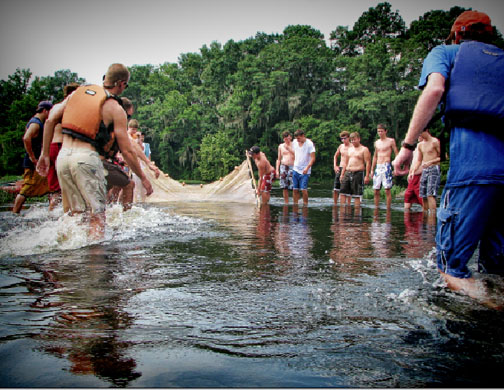AU Fish Camp Lures Future Students

There’s something fishy going on at Auburn University, and it’s accompanied by the sound of children laughing and learning more about aquatic life.This summer marks the fourth anniversary of AU’s Fish Camp, June 25-29, where students can learn the intricacies of aquaculture and how the excitement they experience wading in a stream could translate into a career.“The camp is open to high school students ages 15 to 18, and due to the hands-on nature of the camp, participation is limited to 25 students,” said camp coordinator David Cline, an Extension aquaculture specialist. “Students have the opportunity to make their own lures, fish for trophy-size bass in the AU fisheries research ponds, kayak in the Coosa River and seine a fish pond.”
Those fun-filled activities help expose students to a potential career in aquaculture and fisheries, Cline said, adding that the experience is a fun exploration camp that sneaks in a lot of learning.“Camp participants will use what they gather in streams, including insects and other aquatic life, to determine the health of the stream and the effects on the plants and animals living there,” Cline said.The camp costs $485 and includes five days and four nights at Auburn University. The fee covers the costs for all food, lodging, transportation and activities. The camp involves a lot of field and outdoor activity and is a great opportunity to learn from renowned fisheries, aquaculture and aquatic ecology professionals, Cline said.Alabama Farmers Federation Catfish Division Director Rick Oates said the camp is important because many students who attend may not have considered a career in aquaculture. “While the camp introduces students to a variety of fish species, it’s important to catfish producers because future scientists and farmers will definitely be needed in our state’s growing catfish industry,” Oates said. Alabama is the second-largest state in catfish production and has an annual economic impact of $223 million.
If there is enough interest, the program may grow to include a second camp, July 9-13.For information about the camp, contact Cline at clinedj@auburn.edu or (334) 844-2874 or James Birdsong at james.birdsong@auburn.edu or (334) 844-5817.
